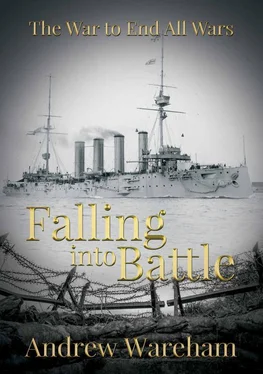Simon noted the faint query raised regarding his legitimacy and chose to ignore it – as a naval officer he could not be a bastard, in the legal sense at least.
“I at least know the names of my grandparents, Mr Secombe. More than that seems unnecessary. Why, I wonder, did they specify that I should be given that information if I am not to contact them ever?”
Mr Secombe shifted uncomfortably in his chair, tried to seek the blandest possible words.
“As a naval commander or captain, sir, you will expect to marry inside the bounds of Society. It is necessary then to know your antecedents – one might not like to consider an inadvertent alliance within the realms of consanguinity.”
Simon was silent for a few seconds, making sense of the reply.
“Oh! One in the family is worth two in the bush, as they say! No incest to add to the scandal.”
“Quite.” The lawyer did not approve of Naval vulgarity.
“I shall bear that in mind, Mr Secombe. It will not be a matter to be considered for a number of years, of course. I would not expect to enter into marriage before my mid-thirties – naval officers generally do not. It is very likely that my future bride has not yet gone to school.”
The lawyer was pleased to have completed the potentially difficult part of his task. He had feared that he might have had to persuade the young gentleman that he should not make contact with his grandparents, that they would not be likely to change their minds and accept him into their family. Evidently his client was content to be an orphan who would eventually create his own kin.
“Marrying late is part of your profession, sir. Might I suggest, sir, that you sign a full Power of Attorney allowing your trustees to take any action they may consider necessary to safeguard your fortune. I should explain that we would generally be expected to place all of your money in the Funds – a safe holding. In case of war, however, the face value of such holdings might fall substantially. If war seemed likely we might wish to sell out of government stock and purchase shares in arms manufacturers – the one likely to fall, the other certain to rise.”
“That seems sensible. Do you not have that power already as trustees?”
“We have, but only for the next seventeen months, sir. You will attain the age of one-and-twenty on March Sixteenth, 1915. At that point, we cease to have authority as trustees and would require the Power of Attorney to act for you if you were not in London.”
“It is now October ’13 and I am posted to the destroyer Sheldrake which is bound for the Mediterranean station. That could easily be a two year posting, although wartime conditions might change anything. Yes, it makes sense to give you the power to handle my funds in my absence.”
“Very good, sir. I have the document drawn up in standard fashion for a military officer going overseas. It is rather a commonplace for such forms to be offered.”
Simon signed as was necessary, in triplicate.
“How do I go about drawing against my income when I am in the Med, Mr Secombe? As a midshipman all was handled for me by the Paymaster aboard St Vincent , to prevent any possibility of overspending. As an officer, I believe I have responsibility for my own money.”
“You have an account with the Provincial Bank which has branches in Gibraltar, Malta, Cairo and Alexandria and has agents at Nicosia in Cyprus. The bank will notify its managers that there is an account held by an officer aboard Sheldrake and you will be able to write a cheque for cash at any one of those ports.”
“There will be tailors’ bills, I must imagine. Little point to buying warm-weather clothing in England.”
“Of course. What are you to do for the few days before you join Sheldrake , sir?”
“The basics of uniform – I must equip myself as a sublieutenant. That apart, a room in a small hotel and a few shows, I must imagine. My shipmates are posted away, and I am on my own in London.”
“The ‘Girl on the Film’ at the Gaiety is well recommended, I am told, sir, and there are the moving picture theatres which are all the rage now.”
“Never seen one of those, Mr Secombe. Not much chance at Dartmouth and then on a long cruise on St Vincent .”
Simon made his thanks and set off for Gieves, willing to go to the most expensive of naval tailors now that he knew he had an income to cover their bills. He ran into Adams, busily specifying the best possible cloths as befitted an officer in a flagship; he was amused.
“I am for a destroyer – robust rather than elegant, I think.”
The assistant agreed. Destroyers were renowned as difficult postings; an officer might find it hard to dress as a gentleman aboard such small ships.
“ Sheldrake , sir, is to sail in eight days, from Chatham.” Gieves was aware of all naval movements. “The bulk of your uniforms will be delivered to you there one week from today. We can provide you with a suit of working dress in two days, together with adequate mess dress for a sublieutenant on a destroyer.”
The small ships were not fashionable and their officers rarely had significant private incomes; mess dress did not need to be of the finest. Simon would almost certainly be the richest in that wardroom.
He found himself in Chatham a day before his time to report – a wise move for a junior officer. There was a detachment of Naval Provosts at the station, necessary to subdue any drunks rolling out of the third-class carriages – there were always some, every day.
“I am Sublieutenant Sturton, for Sheldrake . Do you know where she is lying, PO?”
The petty officer did – it was part of his job to answer such queries.
“In the yard, sir. Due out today on the afternoon’s tide.”
“Boiler clean?”
“No, sir, repairs. Her previous captain misjudged the set of the current, sir, and collided with Bristol light cruiser. There was some damage to the forecastle, sir.”
“New captain.”
“Yes, sir. Joined last month. New lieutenant and sub, sir. A commissioned gunner as well, sir. Engine room Chief ERA remains, sir.”
“Bloody hell!”
“Yes, sir. I’ll send one of the men to guide you, sir. Your porter can bring your trunk and case that far, sir.”
A complete sweep of the deck officers suggested that Sheldrake had been less than wholly efficient and that the remaining crew would have known it. The new captain would be – if he was any good – tightening up the whole ship. His officers would need be very nearly perfect. Simon wondered if he had been posted intentionally, either to help smarten up the ship or to gain some extra discipline himself. He would have to be at his best, which he would have been in any case on a new ship having recently gained his commission.
He ran over his uniform; cap set precisely square – none of this Beatty nonsense; necktie properly knotted; all buttons hastily checked; a quick rub at his shoes. Ready to face a new captain, Simon reported to the seaman sentry at the brow.
“Sublieutenant Sturton reporting aboard.”
“Sir!”
The officer of the day was called – the ship was not at watches while still in the dockyard.
They exchanged salutes, weighing each other up in the few seconds available.
The lieutenant saw a tall young man – not a boy – shaping up to be powerfully built, one who might have to watch his weight in later years. A confident but not cocksure appearance and very well presented. An alert face, not overly handsome and suave, but blue eyes watching and weighing. At first sight, a good sort to have aboard.
Simon repeated his words to the sentry.
“Well on time, Sturton. A good start! I am Lieutenant Dacres. Captain Smallwood will wish to see you first thing. One trunk and a suitcase, I see – wise to bring no more aboard, no space for it in your cabin. Two trunks from Gieves have been placed in temporary storage and will go to our depot ship, wherever that may be. No luxury aboard Sheldrake . Commissioned Gunner is due to arrive as well – Bains, his name. Remain in reporting uniform until you have seen the captain then ready yourself for work, if you will be so good.”
Читать дальше












